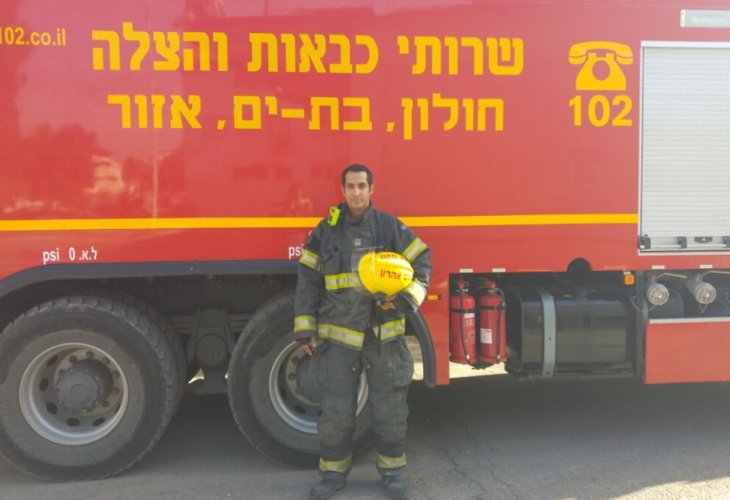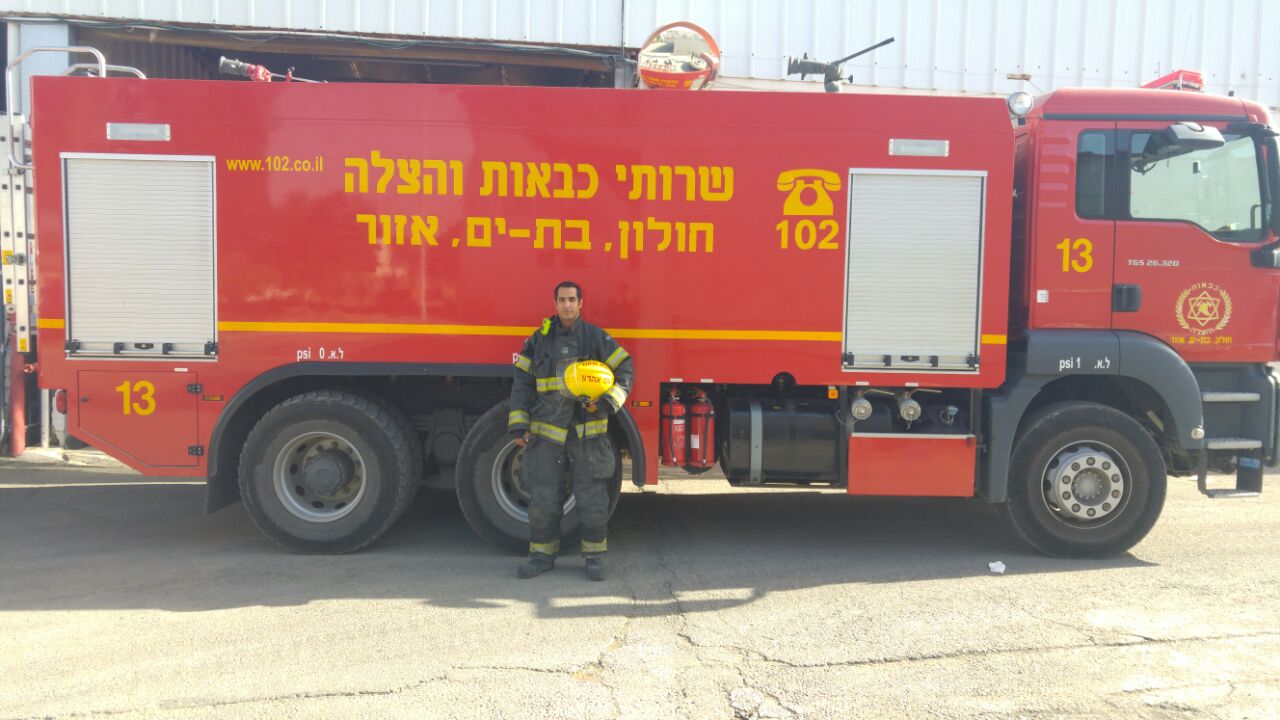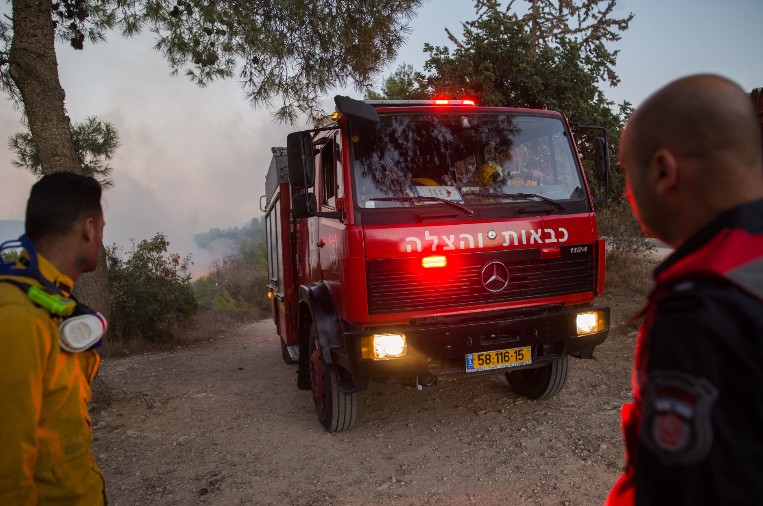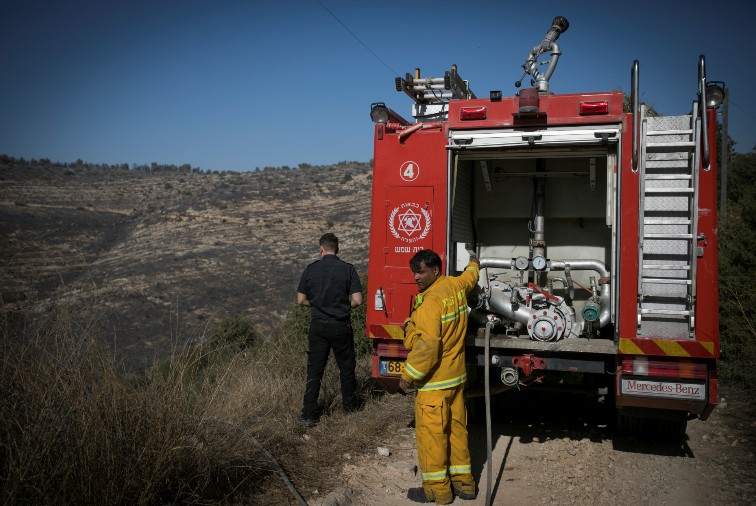Firefighter Testimony: "We Fought Flames Over 10 Meters High"
Chief Firefighter Noam Aharon was among those battling fires continuously in Haifa for three days. "We went from house to house, witnessing the damage firsthand, and knowing it was impossible to overcome naturally," he recounts. What revelation did he discover about the people of Israel amidst the flames?
 Firefighter Dudu Aharon
Firefighter Dudu Aharon"Standing before flames over 10 meters tall, you realize there's naturally no way to control them, so you try to save what you can. But with such winds, you quickly find even that is nearly impossible," says Chief Firefighter Noam Aharon, spokesman for the Holon Fire Station, recounting the toughest days he ever remembers experiencing.
Alert and Readiness
"It all started on Wednesday," he recalls, "When I and my fellow firefighters received a general alert from Holon Station to be prepared due to fires across the country. We were swiftly informed to get to Haifa as fast as we could. Without a moment to spare, we raced to grab equipment and head north. Each of us packed a small bag, unsure if we would sleep in Haifa, and if so, for how long. We knew it would be lengthy but didn't anticipate the extent."
Why bring firefighters from the center to Haifa? Are there not enough in the north?
Aharon explains: "In times of emergency, Haifa couldn't dispatch all its teams as they always need to reserve some for other potential incidents in the city. This is why in such situations firefighters are recruited from all over the country, and that's how we came to reinforce the area."
Aharon arrived with his team leader, Rasar Asher Fattal, and another firefighter, Shlomi Hakmon. "We came in a standard fire truck, converging in a designated recruitment area, where we received assignments and were sent to the field. We were assigned to an area around Romema neighborhood, an effort that was insane, truly endless. We were divided into teams - some prevented gas leaks, others stopped fires inside rooms, and some stood in open areas to prevent flames from spreading. It's important to understand that these were enormous flames," he emphasizes, "Flames over 10 meters high."

How do you control such high flames?
"The truth is, with natural forces, there's really no way to control them," he states. "All we can do is preventive actions, such as cooling areas and trying to protect what we can. On the other hand, planes worked from the air, truly extinguishing the fires by dropping fire retardants. Our main work was immediate response and managing smaller hotspots before they grew."
How does witnessing such destruction feel?
"The destruction is truly immense, beyond description. Yet, we had no time to process it. We had to act quickly, not wasting a second. In such situations, sadly, we are experienced, and we've trained ourselves to completely detach emotionally to effectively do our job."
The People of Israel at Their Finest
During their relentless work, Aharon notes they occasionally encountered residents. "These were very difficult moments," he recalls. "We saw them return to their damaged and burned homes, and our hearts ached. So many families lost everything in an instant with nowhere to return to, and countless animals perished. We sat and cried with them and tried to save any small parts of the apartments we could."
 (Photo: Flash 90)
(Photo: Flash 90)Aharon recounts how firefighters, after saving a room, found the water used to extinguish the fire flooding the rest of the house. Unrelenting, they drained the water, lifted rugs, and protected belongings. "It's not our official role, but we do whatever we can to minimize damage."
Do you think people appreciate your efforts?
At this question, Aharon smiles. "Not only do they appreciate," he stresses, "but they're our true strength. Words can't express the love showered upon us when we arrived in Haifa neighborhoods. Residents constantly approached us, offered hugs, food, and drinks. My fellow firefighters from Beit Shemesh, Nataf, and Abu Ghosh reported similar stories. Everyone was amazed, speaking about the people of Israel revealing their full glory in such times."
Aharon insists on praising the residents' high awareness and compliance with instructions. "I shudder to think what might have happened had they been negligent or delayed. We might have prevented many disasters. While homes were damaged, thankfully, there were no casualties, and that's what matters most."
 (Photo: Flash 90)
(Photo: Flash 90)Conversely, he also notes that during the events, many citizens demonstrated initiative by fighting the flames with hoses before the fire crews arrived, protecting their own or neighbors' homes. "Undoubtedly, it prevented greater disasters."
Is this really recommended? Isn't it better to flee?
"There's no single answer," he stresses. "Some can act and handle the task, while others flee in fear. Of course, people shouldn't try to be heroes, but if it’s something manageable, why not? I’ve certainly seen numerous events where initial response made all the difference."

